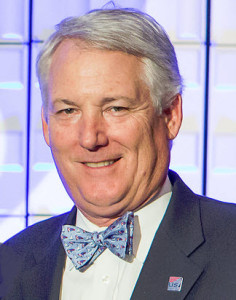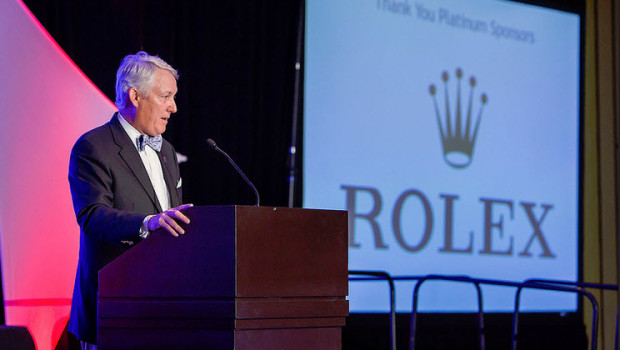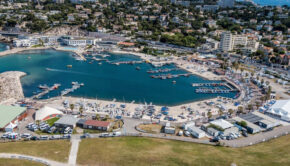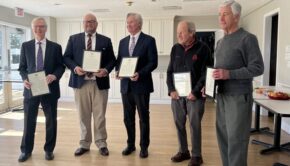Bruce Burton: Both Hands on the Helm
Published on March 3rd, 2016
For the first time, the annual US Sailing National Conference and the biennial Sailing Leadership Forum were brought together February 2-6 in San Diego for a full schedule of meetings and presentations. It was also when newly minted US Sailing President Bruce Burton took charge. Here Scuttlebutt editor Craig Leweck checks in with Bruce…
 How did your involvement with US Sailing begin?
How did your involvement with US Sailing begin?
Gary Jobson called me during his presidency, I think it was in 2010 or 2011, and said to me, “Bruce, you’ve been very fortunate in our sport, won some big regattas and been at it a long time and you’ve done well in business and it’s time for you to step up and start serving.” And I said, “Well, what does that mean, Gary?” He says, “I think you ought to run for the US Sailing Board.”
My initial reaction was that I didn’t think I was qualified, and there are so many great race officials and judges and people that have come through the system. But he wasn’t looking for a no. He said, “We need some guys that are sailors at the top who have some business sense. You’ve been through a few Olympic programs. That might be a good thing to bring to the table, so why don’t you try?”
So I ran and then was nominated vice-president after I was elected. The presidency term is three years, so during this period I had a chance to serve under both Gary and then with Tom Hubbell during his presidency, and it was very enjoyable serving with both of them. When it was asked who wanted to be president, everybody must have taken back one step and I was left out front, so here we are.
So you’re in year one?
I’m three months into it and the honeymoon officially ended with this conference. I’ve attended them before but it’s one thing to sit there and watch and another to lead it. Last year I was really trying to watch Tom on how he worked the role as I was going to be in those shoes this year. It’s a lot different when you’re standing in front of the public. I’m not a very good public speaker. I’m more of a company leader. Talking to employees is different than talking to customers. But it’s been very enjoyable and people are very supportive.
The format for the National Conference has evolved. What’s the initiative there?
We want to be very relative to the areas of the sport that we think are going to grow and to really be relevant to the current interests of our constituents. We’re trying to broaden our base and be contemporary. We are not a user-friendly organization. We’re perceived as the government, we have been the government, but we realize to be the best service to the sailors of the United States, we’ve got to get out of that mode. We need to give the service that Federal Express gives. We’ve got to give the kind of service that Google gives. Obviously we can’t get there but we need to go in that direction.
People often look to US Sailing to grow the sport. Can US Sailing be that lightning rod?
Well, that’s a really good question. Ultimately, it really gets down to an active sailor that’s going to do the work to invite a friend to go sailing. So in that regard US Sailing can do that. We can be a catalyst and a leader to help promote the characteristics and the people that will go do those things and invite a friend to go sailing.
That’s really what it gets down to… when we ask a friend to go sailing. So somebody has to encourage people to do that. I think US Sailing is one of the component parts of that. We’ll take the lead in doing that, but it’s going to get down to the work of everybody. It’s the boat builders, it’s the sailmakers, it’s the instructors, and it’s the club members. It’s everyone. US Sailing has to be the catalyst for it, but we won’t be the one that does it.
What are you excited about right now with regard to US Sailing?
I’m excited about a number of things. I’m very excited about the success and the competence of our traditional areas of excellence. It’s the foundation. Our race management, our judges, our education, the way we produce those products I think is exceptional. I’m excited about that. And the opportunity is that we don’t necessarily package them up into a complete solution.
We’re talking about in the boardroom in that we build spark plugs, wires, tires, rims and glass. I’m from Detroit, so everything’s the car analogy. When you walk in to US Sailing, it’s like walking into an auto parts store. You want to buy a car, but all you see are parts, and at times we don’t have very good assembly instructions. So we want to take our great products and assemble them and make them easier to understand and utilize.
If you look at our website, it’s very cumbersome. There’s a lot of things going on there, and that’s because we try to do a lot of things. So I’m excited about the fact that we have products that are really mature and good and we can build off of those and package them up better.
I think in the areas of growth we see our youth sailing initiative that we’re taking on as being really key to helping grow the sport in that regard. We’re hiring a new youth director with the mission being to forge a clearer pathway for sailing as a life sport and also for our Olympic team.
One of the difficulties with our Olympic team is they are not getting sailors that are as well prepared as they were 30 years ago to sail these Olympic boats. That is a characteristic, a little bit, of college sailing. A lot of the kids now are doing so much college sailing that when it comes to the summer sailing, they teach sailing as opposed to sailing in Olympic class boats.
When I was in college I taught sailing but I also sailed an Olympic class boat. A lot of the young people aren’t doing that anymore while in college, so we’re losing four years of Olympic class exposure. So I’m excited about our willingness and the initiative we’re going to take to try to work through that.
Can you share more information about this new position of youth development director?
We’re bringing that on, we’re funding it, and we’re writing the job descriptions right now. We had board approval of it. It all came out of initiative of our Olympic review that we did a year and a half ago. We just need to make sure that the kids are properly prepared. If someone decides to do an Olympic program, we need to have a tool kit. How do you raise the money? Where do I get the boats? Where are we training? It needs to be simple but complete.
Parents go, “My kids want to go to the Olympics, what do I do?” Well, if they’ve had another kid or somebody else has done it in the club, there’s a road map, but if you’re a parent with a really talented kid but not sure how to proceed, we need to have a cookbook for it. We are a lot better now than we were 20 years ago, don’t get me wrong. But to compete with stronger countries like Australia and England, we just have to get better. So it’s not really that we’re bad, it’s just that there’s other countries out there that are better.
Will this position be focused primarily on Olympic sailing or all youth sailing?
Right, it’s focused below that Olympic level. We have the Olympic development program, so what this position is going to do is make sure that the kids are properly prepared to enter that Olympic development program.
There’s more to youth sailing than the Olympics, and there’s also more to youth sailing than prams and institutional-type doublehanders. What about youth keelboat programs?
The keelboat program is a perfect example of building spark plug wires, okay? That is a component part of the whole youth program. So we already have keelboat training. That can be brought right in as part of the full solution for youth sailing. I think that we need to have parallel paths for youth development – it can’t just be racing centerboard boats. It needs to be sailing keelboats.
One thing I don’t think we do a lot of, or I have at least not seen it – maybe I need to spend more time on the plant floor – is promoting kids that want to be race officials. It’s amazing to me that when you look at everybody in the boats, they’re all – let’s just make this up – 15 or 16 under. When you look at the guys that are in the RC boats, they’re all much older.
There’s some young people that want to do this. We are losing a lot of kids to the sport when we don’t offer options. Maybe they are not great racers, or at least not yet, and it can get discouraging. We need to keep them involved with the sport. We need to ask them to be part of the administration of it, the management of it.
For 2016, what are some of the big initiatives? Certainly the Olympics is on the calendar, but what are some of the other items that will touch the membership?
The youth director is a really big thing. The offshore initiative working with SAP is a really big thing. We are working to have a Universal Measurement System utilizing a SAP database where all the manual measurements get loaded. What this means is that, say you want to get an IRC certificate, but later find you want to compete in a race using ORR or ORC, the same measurement information can be used to produce those certificates. This is huge as before you had to bring the measurer out all the time. That’s really exciting to me, because that’s a cost savings and it’s a time savings, and it’s better for the regatta organizers and better for the boat owners. So I’m really excited about that.
The services provided by US Sailing cover a lot of ground. With your racing background, what have been some of the things that have enlightened you about US Sailing?
That’s a great question because as I got launched on the board, you’re being put in the executive suite. Well, if you’re plopped into the executive suite, the best thing you can do is walk out on the plant floor. Get out of the office and walk out to where you’re building the parts. And the things that I didn’t realize when I first signed on is the level of competence that we have in training and education. We don’t see that on the racing side. The highest growth areas in our sport right now that we see are in community sailing and high school sailing. That’s very instructional-based and is not necessarily coming out of the yacht clubs.
So we recognize, in our awards, people that are supporting those growth areas because those are the people behind the scenes that never get recognized. I think that’s very important. The only thing we have in these kind of volunteer activities is the attitude of gratitude. That’s our only currency. We don’t pay people money to do these things. So the only thing you can do is thank them, reward them, encourage them. If you have to criticize, do it in a constructive manner so everybody is better off for it.
So when we have these awards dinners and banquets, and we hand out these trophies, this is their payroll. That’s how you do it. For the other people that didn’t get the awards, they see that “Hey, this is the standard of excellence that I need to work to so that I can get that.” For me it’s been great, and I think that the racing sailors need to understand there’s a lot more to it. When you want to talk about saving sailing, if we do well in these non-traditional areas, that’s one of the best ways to do it.
US Sailing is viewed as this leader of the sport, so I suspect the organization spends effort looking at the whole country and figuring out what solutions can benefit different areas. Is that a fair assessment? If clubs or organizations are curious as to how they can handle certain problem, should US Sailing be that resource?
Yes, I think we are, and that’s also part of the reason for the Leadership Forum. This forum is used so best practices can be shared. So regardless of what area you are coming from in the country, we ask people with best practices to show up here. US Sailing is not looking to try to take the actual leadership position, but we know that there are people and clubs and organizations out there that are the best. By bringing them into this forum, we create an environment of collaboration and idea sharing. From whatever geographic area or whatever type of organization, the Forum provides the platform for these leaders to share those best practices.
If we see very proprietary narrow-focused things that the market is not doing and we know it needs to be done, to be that leader, we will definitely step in that role and do it. There’s no doubt. Obviously like the racing rules, that’s not a leadership thing, but it’s a standard that has to be set by someone.
I’m kind of just imagining things, but if there was an ultimate website that would promote sailing, and you could hit the button and you’re an instant sailor, that’s something we would do. But short of that, we have to be the catalyst that brings everyone together so these best practices are shared.
That’s really kind of the American Way, as opposed to Europe, which is more top down. In the US, we really don’t like that top-down thing. We’ve tried it at US Sailing where we had mandatory membership. I think we lost 5 or 10 thousand members. So we do have that corporate memory in that regard. We’re not going to go there again, I don’t think. At least not on my watch anyway.
Often people refer to US Sailing as this thing, but when I am witness to US Sailing at events, I am reminded that this thing is a bunch of people trying hard and working for the sport. I suspect that’s a tricky vision to present.
That’s a really good observation. There’s an expression that I’m going to say that might be a little crude, but ten “Atta boys” are ruined when there’s one “Aw sh#t.” You can do ten things right, but if you do one thing wrong, that’ll destroy the ten things you do right. Unfortunately, any organization can be criticized for that. So what we’re trying to do at the board level down is ensure that the quality and delivery of what we’re doing for our members and our hope-to-be members is the best we can make it.
One of the things that has come out of the forum is something we’ve been really trying to be attentive to, which is communication and timeliness. We’ve had some things that have happened. Things that are just normal course of business, like somebody’s membership didn’t get renewed or their judge’s certification didn’t get updated promptly. We are giving prompt attention to those situations.
I recently made a personal phone call to a member who couldn’t get her credit card to work to apologize for her having difficulty with our website. We had our membership manager call her. We made two phone calls. She sails out of the GYA. She called me back, she said, “Thank you.” Now, I can’t guarantee that I can do that every time, but in spirit we want to do that every time.









 We’ll keep your information safe.
We’ll keep your information safe.